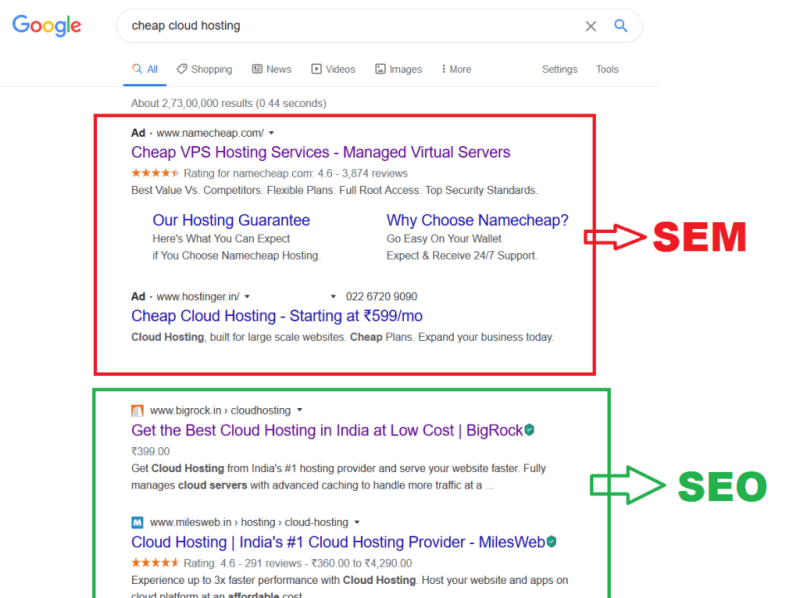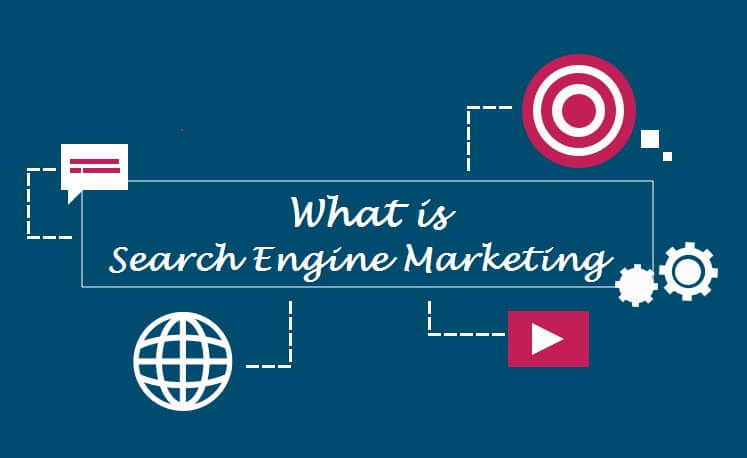Search engine marketing or SEM is the strategy to make the web site available on the first page of the search engine results pages ( SERPs) using paid advertising. And no matter how long and how much money you spend on search engine optimization and keyword analysis, it’s tough to rank on the first page, especially for competitive keywords. SEM can be the key to exposure and sales more quickly than SEO alone.
SEO vs SEM
SEO and SEM are often confused in the field of digital marketing. Although closely related, they are two very different terms, all under the umbrella of “search marketing.” SEO is concerned with organically growing clicks while SEM relies on paid advertising to view your website, product or service on the first pages of the SERP. Both are central to the marketing plan of an organization today.
SEO uses a set of rules and best practices (according to Google’s ever-changing algorithms) to help a business ‘s website make it to the first page of search results organically, without having to pay for the position.
SEM allows businesses to push and get to the top quicker, allowing companies to produce successful results without waiting. SEO is unpaid while SEM is paid. Check out below figure. We search a term “cheap cloud hosting“, and the first two results that came are SEM, and below that, you can find a website links as per Search engine rank positioned through SEO.

The Basics of SEM
What is SEM? A breakdown of all that SEM includes begins with paid search ads. Google advertisements paid for by the business owner appear at the top of the first page of SERPs when a user searches for a particular keyword. The pay systems are different depending on the form of a paid advertisement in which a business chooses to invest. You should know a few keywords when it comes to paying SEM ads:
PPC (pay by click).
The most common type of SEM is PPC ads. The marketer pays for the advertisement with PPC only when a user clicks on the link. You didn’t have to pay a penny if a user sees your ads but doesn’t click on it. You need to pay a small fee every time a user clicks on your ads in PPC search engine. If done rightly, then potential investment returns (ROI) will be higher than the cost. You can make a significant profit if you pay $2 for a click, and the consumer ends up purchasing $200 product or service.
CPA (cost per action).
Your CPA is the overall cost divided by the sales you received for your PPC campaign. The estimation of your CPA lets you determine whether your paying SEM plan results in more benefits or expenses than you do. CPA will allow you to consider your marketing campaign’s financial impact. Average order value (AOV) and consumer lifetime value (CLV) of your business can be measured for an appropriate CPA.
CPC (cost per click).
CPC refers to the actual expense of a PPC marketing campaign for every click. This is an average of sales for a given amount of time with the rivals. Your CPC will be equal to or below your maximum keyword bid. Calculation of the CPC is the Competitor Ad Rating, plus $0.01. Your CPC can help you to understand how much to offer. In all sectors, the average CPC is $2. You are using a CPC calculator to see where the business stands.
CPM (cost-per-thousand-impressions)
CPM refers to how much marketer spends on 1,000 advertising impressions on a search engine. For instance, for every 1,000 impressions of your ad, you will pay $2 if the search engine charges $2 CPM. (The M is the Roman 1000 number). CPM is the most popular web ad pricing scheme. You can measure CPM’s ROI by analyzing your click-through rates or how frequently your ad users click compared to the number of impressions.
Your budget and promotional goals will adjust your SEM approach. Nevertheless, all types of paid SEM rely on keyword analysis. You must pick those keywords to display your advertising as users search for those words. For example, to appear on the SERP for the digital marketing company, you need to make an application for those keywords. It would help if you first mastered keyword research and bidding to achieve success with paid search advertising.
How to conduct research on SEM keywords
Before you can begin with SEM, you first need to understand which keywords your business can use. When you are new and try to conduct keyword research, it might seem tough, but thanks to the resources available, it is relatively simple. Next, look at the brand’s keywords. Create a list of terms and conditions applicable to your company, generic names, general terms and competitor terms. Put yourself in the shoes of your target consumer and think about what words your company will use.
Use a research tool like the Google Keyword Planner to learn more about keyword analysis. Enter the keywords to find specific keywords in your list. You can also see the search volume for each word and the competitiveness of the PPC bidding for the term. The higher the keyword competition, the more will be CPC as well as higher chances of ROI. The optimal situation is to find a keyword with high yet small search volumes.
Which Paid Search platform is right?
Maximize the effectiveness of your SEM campaign by using the right platform for your particular needs, or by merging various platforms. The most popular one is Google Ads, where you can create a free account and bid immediately. You’ll only pay for Google Ads if anyone clicks on your ad. You can begin offering on any budget. The following are two additional SEM platform options:
Bing advertising: The Bing SEM solution shows Bing Network ads – which cater for approximately six billion searches a month. You pay only for clicks, and you can check keywords and bids to optimize ROI. There are no minimum fees. Note that Yahoo: Bing and search ads are on the same network.
Social network PPC ads option : SEM ad campaigns are also provided through social networks. For example, Facebook ads allow you to advertise on Facebook, Instagram and other Audience Network apps/sites. Set your target, pick the format of your commercial and put an auction. The best way to put your paid ads depends on your goals, your business and your budget. You may want to advertise for maximum coverage and exposure through all channels or choose the best place for your ads based on the demographic or marketing objectives of your target customer.
